A strategic investment in human capital
When the National Fund for Employability and Apprenticeship unveiled its gleaming training vehicle in Brazzaville, the gesture went far beyond the novelty of technology on wheels. In a nation where more than sixty per cent of the population is under thirty and where, according to the World Bank (2023), youth unemployment remains near twenty per cent, the capacity to diffuse market-relevant skills is tantamount to safeguarding social cohesion. By financing the prototype, the government underscores a conviction that sustainable growth rests on the calibre, not merely the number, of its young citizens.
Over the past decade Congo-Brazzaville has multiplied public programmes dedicated to technical education, often in partnership with multilateral lenders and specialised NGOs. The new unit, a joint conception of Fonea, the Centre for Electricity Trades (CEFA) and the Mosala project, epitomises that collaborative ethos. Minister Hugues Ngouélondelé framed the launch as “an emblem of state responsiveness to the aspirations of peripheral communities”, a statement that resonates with the administration’s emphasis on equitable development.
Youth employability amid economic diversification
For an economy traditionally tethered to hydrocarbons, the stakes of diversification are considerable. The African Development Bank places the non-oil sector’s contribution to GDP at just over forty per cent (AfDB, 2021). Moving that needle upward presupposes a workforce conversant with electrical standards applicable to construction, renewable energy and digital security—precisely the modules included in the mobile programme.
By aligning curricula with emerging domestic needs—residential wiring, photovoltaic installation, motor-control systems—the vehicle situates Congolese youth within sectors expected to expand under the government’s National Development Plan 2022-2026. The plan forecasts a ten-per-cent annual rise in solar deployment, an objective that would be difficult to attain without electricians familiar with off-grid technologies. In this regard, the training unit doubles as an instrument of macroeconomic policy.
Technical innovation and inclusive design
The mobile classroom, a stretchable container measuring 14.5 metres in length, may host twenty-three trainees at once without sacrificing ergonomic or safety standards. Its forty-five-kilowatt generator guarantees autonomy in areas beyond the reach of the grid, while the hydraulic lift ensures that persons with reduced mobility participate on equal footing. Inside, modular workstations replicate the wiring of residential and tertiary buildings, offering tactile practice seldom achievable through textbook instruction.
Such pedagogical realism is amplified by digital interfaces that connect the onboard security systems to the internet, exposing learners to protocols increasingly demanded by international contractors. According to UNESCO’s Institute for Statistics (2022), less than thirty per cent of vocational facilities in Central Africa possess comparable equipment. By taking the laboratory to the learner, Brazzaville effectively neutralises one of the deepest structural handicaps of rural education: the distance separating talent from technology.
Regional cooperation and diplomatic resonance
Although conceived for domestic circulation, the concept has attracted interest from neighbouring states. Cameroonian and Gabonese attachés who attended the unveiling informally indicated a willingness to explore joint deployments along shared borders, recognising that electrical networks and labour markets seldom stop at customs posts. In this sense, the project extends Congo-Brazzaville’s soft-power profile, offering a tangible contribution to the sub-regional objective of professional mobility endorsed by the Economic Community of Central African States (ECCAS, 2023).
From a diplomatic standpoint, the initiative dovetails with the president’s recent statements at multilateral fora, where he underscored vocational training as a prerequisite for continental industrialisation. The mobile unit lends concrete evidence to that narrative and may serve as a talking point in forthcoming bilateral meetings, notably those focused on climate finance, given its emphasis on solar know-how.
Prospects for scalable impact
Fonea’s leadership has acknowledged that a single vehicle cannot by itself satisfy the training appetite of a country spanning 342,000 square kilometres. Yet the pilot’s itinerant logic is inherently scalable. Corporate sponsors in the construction and energy sectors have already signalled potential co-financing, encouraged by fiscal incentives embedded in the latest investment code.
Analysts caution, however, that certification mechanisms must keep pace with mobility. To ensure that credentials earned in Impfondo carry weight in Pointe-Noire, Fonea is working with the Ministry of Technical Education to harmonise assessment standards with the African Qualifications Framework (AUC, 2022). When that alignment materialises, beneficiaries will possess portable competencies as mobile as the classroom that conferred them, fortifying both individual livelihoods and the national development agenda.

